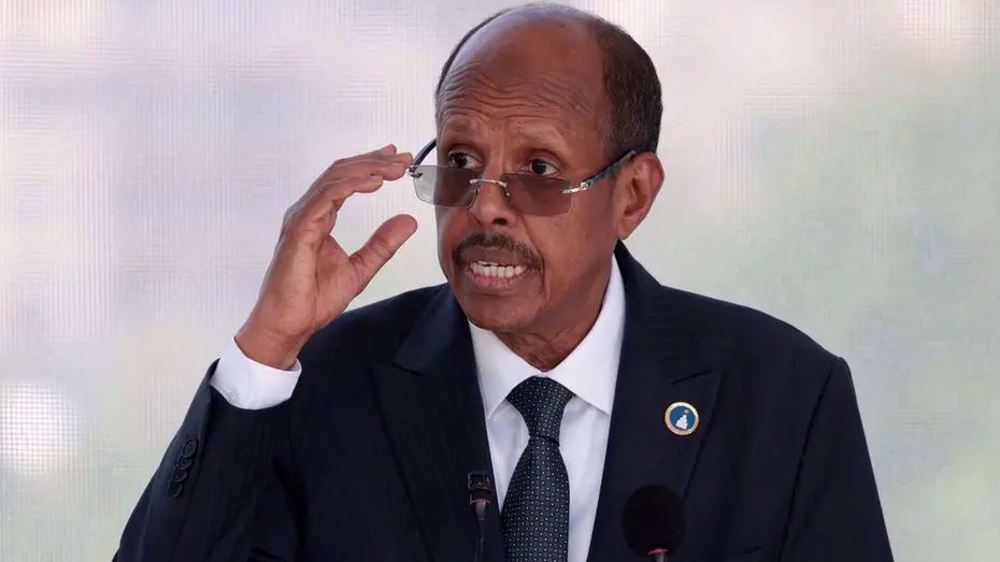South Sudan rebel leader safe in neighboring DR Congo: UN
South Sudan’s rebel leader and former first vice president Riek Machar has fled to the neighboring Democratic Republic of Congo (DRC), the United Nations says.
UN spokesman Farhan Haq said Thursday that Congolese authorities had asked the world body’s mission in DRC (MONUSCO) to facilitate the transfer of Machar and his family from a location near the border with South Sudan to a safe place.
He said the UN mission had “no involvement” in Machar’s departure from South Sudan.
“He has been handed over to the DRC authorities,” the UN official said, adding that the transfer was done for “humanitarian reasons” and “with his consent.”
Haq further said Machar was in danger and was provided with whatever medical assistance he needed.
The spokesman declined to provide further details about his location in the county, but an unnamed source told AFP that Machar could be in the capital, Kinshasa.
The source said Machar wanted “to go as soon as possible to Ethiopia.”
Earlier on Thursday, a South Sudanese opposition spokesman had said Machar went to a “safe country within the region” and was expected to hold a news conference on Friday.
Machar’s spokesman James Gatdet Dak said in a separate statement that rebel forces had managed to foil what he called a “ruthless attempt” by President Salva Kiir to kill Machar.

South Sudan civil war: A timeline of events
December 2013: Fighting erupts after Kiir accuses Machar of plotting to overthrow him.
January 2014: A ceasefire is signed between the government and the opposition.
August 2014: The first round of talks begins in Ethiopia's capital, Addis Ababa, as fighting continues in violation of the peace deal.
February 2015: The government calls off general elections due in a few months because of the ongoing conflict.
August 2015: The president signs an internationally-mediated peace deal under which, Machar would return as vice-president.
April 2016: Machar returns to Juba and is sworn in as first vice-president in a new unity government.
July 2016: Kiir sacks Machar after a new wave of fighting erupts. Machar leaves Juba with his troops, saying he would return only if an international peacekeeping force guarantees his safety.
August 2016: The opposition figure flees the country.
So far, thousands of people have been killed and more than three million forced to flee their homes in the war, which broke out only two years after the country seceded from Sudan to become the world’s youngest nation.
‘Juba army recruiting minors’
In another development, the United Nations revealed that the government in Juba has recruited child soldiers over the past week in preparation for a new conflict.

According to an internal UN document obtained by the Associated Press on Friday, Kiir appointed a senior politician to lead the recruitment of an entire village of boys. The boys, some of them as young as 12-year-old, are being intimidated, according to the UN.
“At this precarious stage in South Sudan’s short history, UNICEF fears that a further spike in child recruitment could be imminent,” said Justin Forsyth, deputy executive director for the UN children’s fund.
At least 16,000 children have been recruited into armed groups in South Sudan since December 2013.
Hamas condemns Netanyahu’s proposal for new regional alliance
Huckabee mocks Arab League's condemnation of his biblical territorial remarks
VIDEO | Trump tariff setback
VIDEO | Press TV's news headlines
VIDEO | Iran will not 'capitulate' since it has military surprises for US
China overtakes US as Germany’s top trading partner
VIDEO | Displaced Gazans struggle to find clean water amid Ramadan
VIDEO | Pakistan strikes militant camps along Afghan border after suicide bombings













 This makes it easy to access the Press TV website
This makes it easy to access the Press TV website